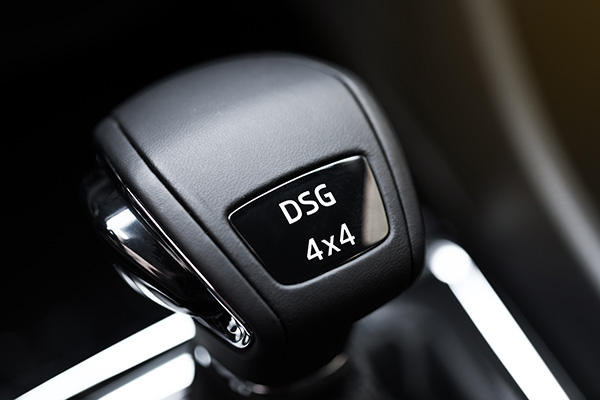
Volkswagen drivers are often surprised to learn just how different their vehicle’s transmission is compared to other cars on the road. Most modern Volkswagen models are equipped with DSG (Direct Shift Gearbox) transmissions rather than traditional automatic transmissions. While both serve the same basic purpose (shifting gears without driver input), they operate very differently under the hood and require different types of service.
DSG transmissions combine elements of manual and automatic gearboxes, using two clutches to pre-select gears for quicker, smoother shifting. This gives them a performance edge, but it also means they need precise, regular maintenance.
If you own a Volkswagen or Audi with a DSG, knowing when and how to service your transmission can help you avoid premature wear or costly repairs.
How DSG Transmissions Work
Unlike a standard automatic that uses a torque converter and hydraulic fluid to shift gears, a DSG uses electronically controlled clutches and internal sensors. These clutches alternate shifts between odd and even gears, which means one gear is always ready before you need it. The result is seamless acceleration and better fuel economy, but only if the system is kept clean and properly lubricated.
DSGs tend to shift faster and more efficiently than traditional automatics, which is one reason they’re favored in performance-oriented vehicles. However, this precision comes with strict maintenance guidelines. VW typically recommends DSG service every 40,000 miles, but depending on your driving habits and environment, you may need it sooner.
How Standard Automatics Differ
A standard automatic transmission relies on a torque converter to manage engine load and fluid pressure to shift through gears. These systems tend to be more forgiving in terms of maintenance, though they are not immune to issues. Transmission fluid still needs to be changed periodically to keep gears shifting smoothly and to avoid overheating or wear.
Unlike DSGs, standard automatics may go longer between fluid changes—typically around 60,000 to 100,000 miles. However, extended intervals should only be followed if the manufacturer has clearly outlined them and your driving conditions are mild. Stop-and-go traffic, towing, and mountain driving can all increase wear.
Why DSG Maintenance Requires Precision
Because DSGs are more complex, they’re also more sensitive to fluid condition and component wear. The transmission fluid in a DSG isn’t just a lubricant. It also helps manage clutch engagement and hydraulic pressure. Dirty or old fluid can lead to poor shifting, slipping, or overheating.
DSG service typically includes draining the fluid, replacing the filter (if applicable), and resetting transmission adaptation settings. This isn’t a job for just any repair shop. It requires VW- or Audi-specific tools and expertise to do correctly.
If your DSG shifts harshly, makes jerking movements at low speeds, or flashes a transmission warning light, it may be due for service. In some cases, early symptoms can be fixed with fluid service before permanent damage occurs.
Signs Your Transmission Needs Service
Whether you have a DSG or a traditional automatic, there are warning signs you should never ignore. These include:
- Delayed shifting
- Slipping gears
- Grinding or clunking noises
- Fluid leaks underneath the vehicle
- Burning smell during driving
- Warning lights on the dash
For DSG owners, early maintenance is even more important. Small issues can quickly lead to larger mechanical problems, especially if fluid contamination affects the mechatronic unit that controls shifting.
Can You Use the Same Fluid for Both
The short answer is no. DSG transmissions require specially formulated fluid that meets very specific standards. Using the wrong fluid, even if it’s labeled as transmission fluid, can result in serious damage. Traditional automatic transmissions also use unique fluid blends, but they’re generally more common and accessible.
Never assume fluid is interchangeable. Always follow the manufacturer’s guidelines or have your repair shop double-check the specifications.
What Happens if You Skip DSG Service?
Neglecting DSG service can cause clutch wear, hydraulic pressure issues, and mechatronic failure. These repairs are expensive and, in some cases, may require full transmission replacement. Routine maintenance costs far less and often prevents these failures entirely.
If you drive an Audi or VW and are unsure about your transmission service history, it’s better to check now than wait for a major issue to show up.
Trust European Auto Hause in Pasadena, CA for Expert DSG and VW Transmission Service
At European Auto Hause in Pasadena, CA, we specialize in Volkswagen and Audi service, including DSG and traditional automatic transmissions. Our technicians use manufacturer-approved tools and fluids to keep your transmission shifting smoothly.
Whether your VW needs routine DSG maintenance or you're experiencing shifting problems, schedule a visit with our expert team today and keep your vehicle performing the way it was built to.